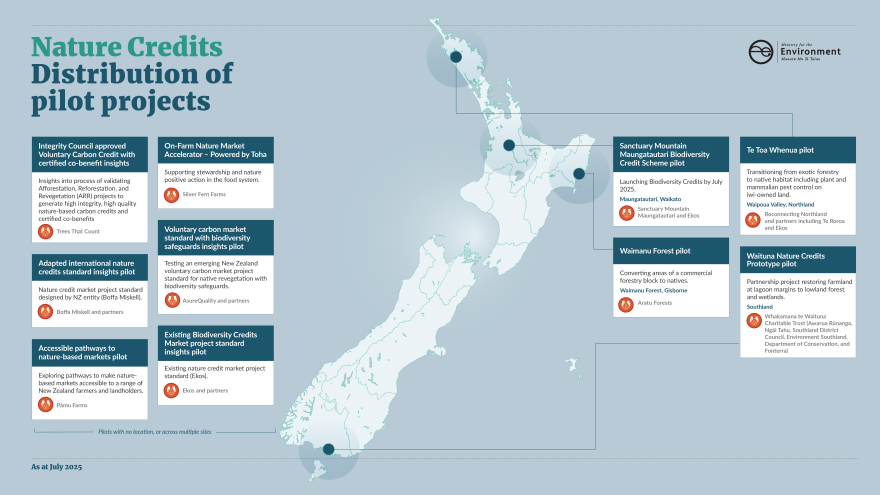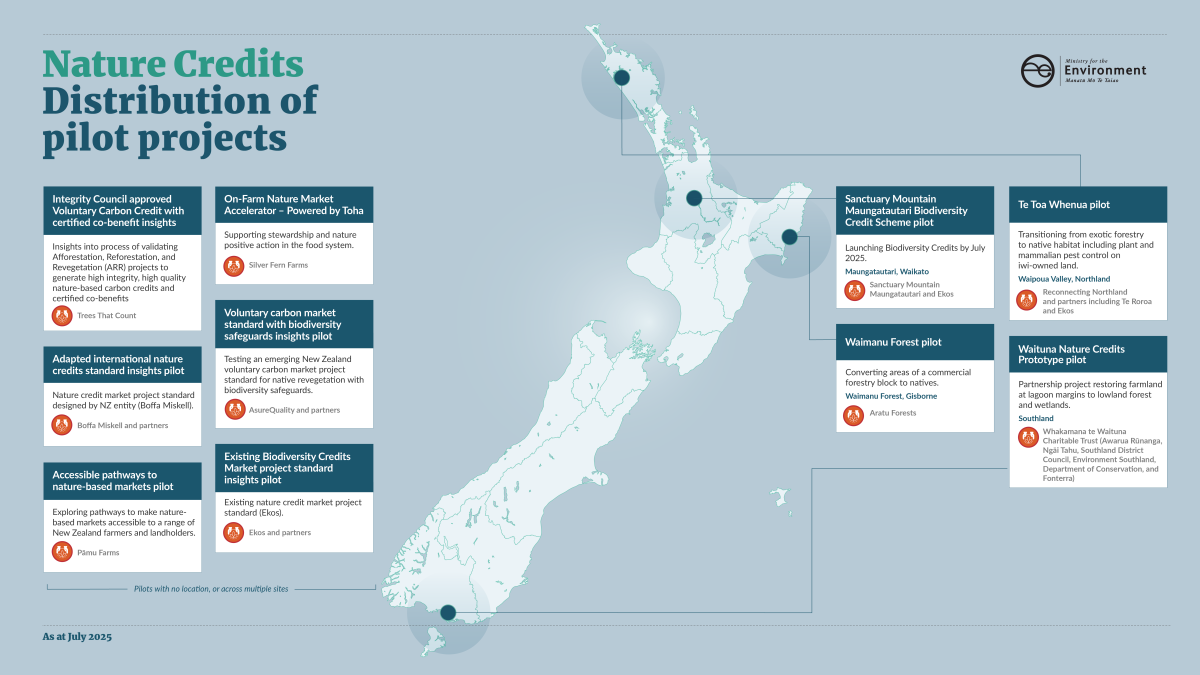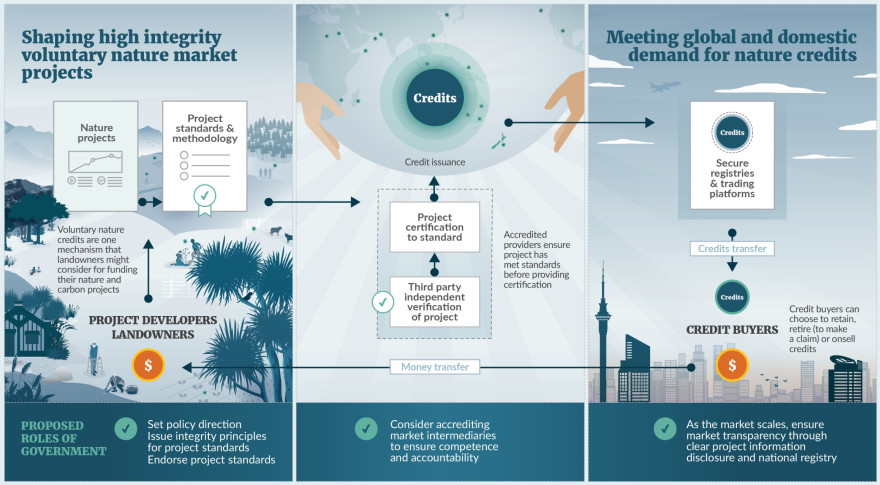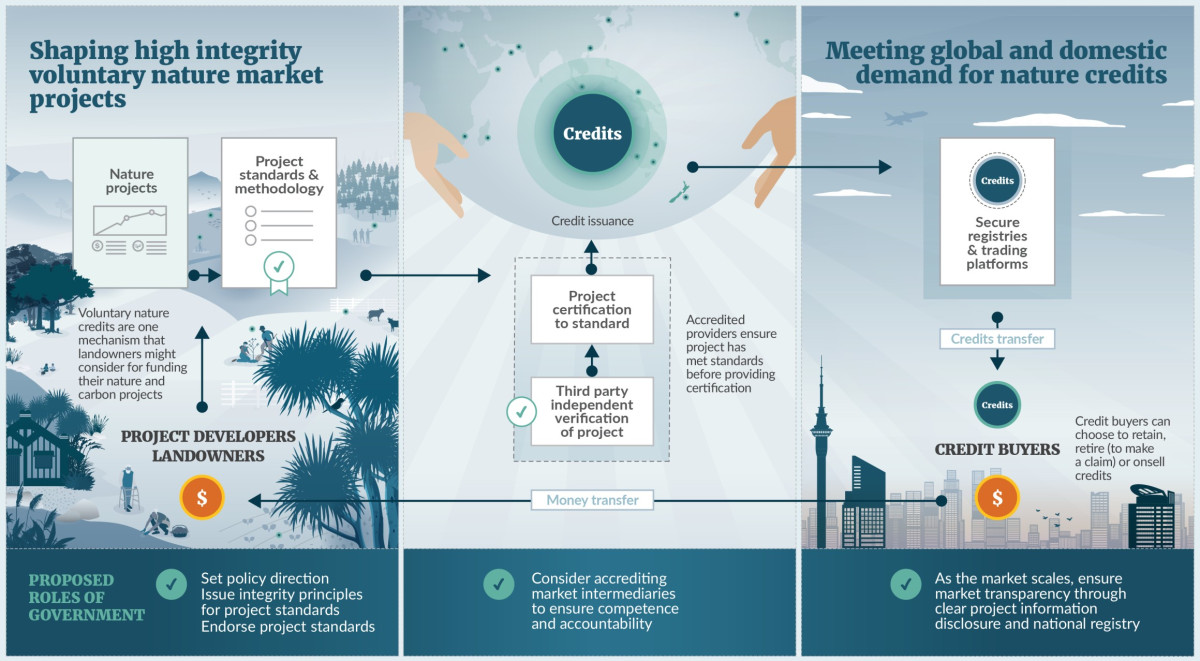Voluntary nature credits market in New Zealand
The Government is backing the expansion of a New Zealand voluntary nature credits market
The Government is backing the expansion of a New Zealand voluntary nature credits market
Voluntary nature credits markets open income opportunities for farmers and other landowners who look after nature on their land by linking them with investors interested in projects designed to protect nature.
Such projects can generate credits for protecting nature and taking climate action. The credits are tradeable and valuable for organisations or individuals keen to make, or be associated with, environmental improvements.
Reputable nature credits markets are intended to attract significant private investment (credit buyers) to:
Credits are registered in the market and can be sold to investors interested in projects and activities that protect or enhance native species or habitats.
Government has a supporting role to play in voluntary nature credits markets. By formalising some market settings to achieve consistency with other countries, investors, landowners and others can be incentivised and rewarded for investing in natural species, habitats and carbon removal.
Market participants say formal arrangements and support from the Government are needed to build trust, growth and investment in the New Zealand market to help bridge ‘the nature financing gap’.
On 12 June 2025 at the Agricultural Fieldays, Associate Environment Minister Andrew Hoggard announced the Government was serious about supporting the expansion of the voluntary nature credits market in New Zealand and is teaming up with interested people and organisations to help build it.
Proposed government roles in a privately driven market will include:
See Minister Andrew Hoggard announcement (Beehive).
See Scaling Up Voluntary Nature Credits Market Activity in New Zealand.
The proposed integrity principles:
The government would use these principles for reviewing and approving project standards for voluntary credits.
Privately funded pilots are underway to help test potential Government roles in the market. This includes a government endorsed qual mark for project standards and measures to assure participants that the market is transparent and has integrity.
The pilots represent different land conditions, locations, types of market participants, and activities. This real-life experience will provide valuable insights as we move to the next stage of market design. The pilots will also help inform what works best in New Zealand.


Led by Trees That Count. Offering market insights into the process of validating a portfolio of indigenous afforestation, reforestation and revegetation projects across Aotearoa New Zealand under an Integrity Council approved international voluntary carbon credit standard to generate verified high integrity, high quality nature-based carbon credits and certified climate, community and biodiversity co-benefits.
Led by Boffa Miskell. Testing at-place an additional NZ Biodiversity Credits Market project standard that is adapting UK methodology to NZ environments as a competitor to domestic or international project standard/certification providers.
Led by Pāmu Farms. Exploring pathways to make nature-based markets accessible to a range of New Zealand farmers and landholders.
Led by Silver Fern Farms to support stewardship and nature-positive action in the food system. Pilot involves testing a processor-led programme for market attraction, and potentially third-party investment, in on-farm nature restoration and enhancement activities that support commercial ‘nature positive’ claims.
Led by AsureQuality. Testing its carbon project standard, which requires native revegetation and includes biodiversity safeguards. Designed to be more applicable and affordable for the New Zealand context.
Led by Ekos. Offering market insights from an existing BCM provider. Includes understanding the journey of Reconnecting Northland’s proof-of-concept project through this process.
Biodiversity Credits Scheme, Waikato, led by Sanctuary Mountain Maungatautari. Observing the current process of issuing credits for conservation and protection activities within the 3,363 ha inland ecological sanctuary.
Led by Aratu Forests. Converting areas of a commercial forestry block to 50 ha of natives for biodiversity uplift and increased recreational and educational values. Scope to expand to up to 5,000 ha.
Led by Reconnecting Northland. Transitioning around 100 ha from exotic forestry to native habitat including plant and mammalian pest control on iwi-owned land.
Led by Whakamana te Waituna Charitable Trust (Awarua Rūnunga, Ngai Tahu, Fonterra, Southland District Council, Environment Southland, and Department of Conservation). Restoring 400 ha of farmland at lagoon margins to lowland forest & wetlands (RAMSAR protected site).


Our native species are at risk despite conservation efforts of landowners, farmers, foresters, iwi and community groups. A voluntary nature credits market in New Zealand could help turn the corner for these species.
The 2023 public consultation on the biodiversity credit markets showed strong support for such a system.
Many corporates, trusts, entrepreneurs and individuals know their businesses rely on nature surviving and thriving and want to support nature investment.
Further details on the Government’s role and the design of the expanded market will be announced in the coming months.
Contact the Ministry for the Environment to learn more about how the voluntary nature credits market could work.